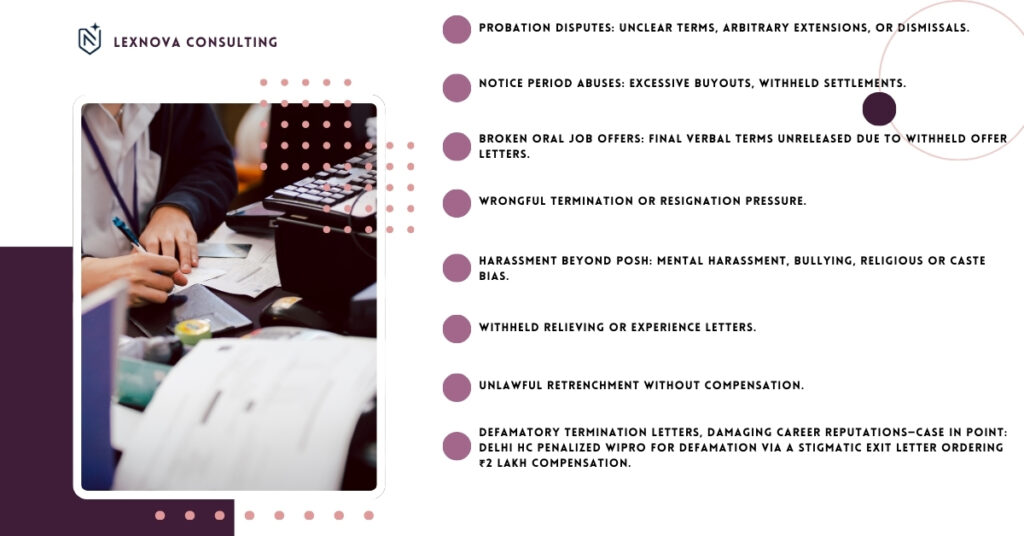Employee Rights in India – An Introduction
Employee rights in India’s private sector are often misunderstood, overlooked, or violated due to knowledge gaps in today’s complex corporate environment. While government jobs come with statutory protections, professionals in private workplaces frequently confront ambiguous policies, whether around probation, notice periods, layoffs, or the absence of formal redressal mechanisms.
This blog, our foundational parent post in LexNova Consulting’s “Employee Rights in India” series, aims to unpack those rights clearly, provide a legal roadmap, and explain why this initiative matters now more than ever.
Understanding Employee Rights in India’s Private Sector
India does not have a single, employee-friendly code for private-sector workers. Instead, protections are drawn from:
- The Indian Contract Act, 1872 : Makes verbal or written employment promises enforceable if proven.
- Shops and Establishments Acts (state-level) : Regulates working hours, leaves, and holidays.
- The Industrial Disputes Act, 1947, especially Section 25F: Once a probationer completes 240 days, they are subject to layoff and notice rules.
- The Payment of Wages Act, 1936 and Minimum Wages Act, 1948 : Ensuring timely and fair compensation.
- The POSH Act, 2013 : Safeguarding against sexual harassment at work.
- Constitutional safeguards under Articles 14, 15, and 19(1)(g) : Which prohibit discrimination and uphold dignity in employment.
Together, these create a fragmented but vital framework of employee rights in India’s private sector.
Common Challenges Faced by Private Sector Employees

Alternative Dispute Resolution (ADR) in Workplace Disputes: A Faster, Less Adversarial Option
In India, many workplace disputes can be resolved without going through the lengthy and costly process of court litigation. Alternative Dispute Resolution (ADR) mechanisms such as conciliation, mediation, and arbitration offer faster, confidential, and less adversarial ways for employees and employers to settle conflicts. These methods are especially relevant for employee rights cases involving notice period disputes, withheld experience letters, verbal job offer enforcement, or wrongful termination.

(A) Mediation
Mediation involves a neutral third-party mediator who facilitates communication between the employee and employer. While the mediator does not impose a decision, they help both parties arrive at a mutually acceptable settlement. This is particularly effective in cases of workplace harassment (beyond POSH), where ongoing working relationships must be preserved until the resolution.
(B) Conciliation under Labour Laws
The Industrial Disputes Act, 1947 provides for conciliation officers appointed by the government to resolve disputes between employers and employees. In cases of unlawful retrenchment, denial of severance pay, or changes in service conditions, conciliation can lead to binding agreements without formal litigation.
(C) Arbitration
Arbitration is a more formal ADR method where an arbitrator hears both sides and passes a binding award. Some employment contracts include an arbitration clause, and in such cases, disputes over buyout amounts, wrongful termination compensation, or breach of confidentiality clauses can be referred to arbitration.
Benefits of ADR in Employee Rights Cases
- Speed: Resolutions often take weeks instead of years.
- Confidentiality: Protects the employee’s reputation and future employability.
- Cost-Effective: Lower legal costs compared to prolonged court battles.
- Preserves Relationships: Allows for amicable settlements without burning professional bridges.
Given the growing awareness of workplace protection laws in India, ADR serves as a powerful tool for employees who want quick and fair remedies while avoiding the delays and publicity of litigation. At LexNova Consulting, we guide clients on when ADR is the right approach and represent them effectively during the process.
Landmark Case Laws That Shape Employee Rights
A. Probation Rights
- Punjab & Haryana High Court (June 2025): Held that “deemed confirmation” cannot override poor performance during probation—even after 3 years—affirming the employer’s right to terminate with due process.
B. Stigmatic Termination
- Chhattisgarh HC (May 2025): Reinstated a peon after nine years, ruling that termination without inquiry is stigmatic and invalid.
- Madras HC (Aug 2025): Ordered reinstatement of a Scheduled Caste professor because termination was stigmatic and breached natural justice—and extended the concept of reasonable accommodation.
C. Wrongful Termination & Compensation
- Jagbir Singh v. Haryana State Agriculture Marketing Board (2009): SC held reinstatement is not automatic; compensation may suffice.
- Bharat Forge v. Nakate (2005): Despite prolonged litigation, the SC upheld dismissal, emphasizing the rigidity of labour retrenchment laws.
D. Violence to Privacy & Dignity
- Maneka Gandhi v. Union of India (1978): Reinforced fair procedure and dignity in state actions under Articles 14, 19, and 21.
- Vishaka Guidelines (1997): Foundation for legal redressal of workplace sexual harassment.
- Puttaswamy v. Union of India (2017): Recognized privacy and dignity as fundamental rights—critical for workplace respect.
These cases establish the legal backbone for defending employee rights in India’s private sector.
Employer Responsibilities: Building Legal & Ethical Workplaces
Employers must do more than avoid litigation, they must foster fairness. Critical actions include:
- Clear probation policies: time-bound, documented, fair termination terms.
- Structured notice period and settlement mechanisms, avoiding buyout ambiguities.
- POSH compliance: training, ICC formation, timely redressal.
- Prevent stigmatic communications—terminate respectfully. Wipro’s ₹2 lakh defamation penalty underscores this.
- Conduct HR due diligence and grievance systems aligned with justice and legal best practices.
- Serve vulnerable communities sensitively, as Madras HC emphasized.
Preventive legal frameworks build trust and reduce workplace disruption.
Our Initiative – What Comes Next in This Series
This is just the beginning. Upcoming blogs will deep dive into:
| PROBATION PERIOD RIGHTS |
| NOTICE PERIOD & SETTLEMENT |
| VERBAL JOB OFFER ENFORCEMENT |
| HARASSMENT BEYOND POSH |
| EMPLOYER POLICY BUILD-OUT |
| WRONGFUL TERMINATION REMEDIES |
| RETRENCHMENT & SEVERANCE |
| DEFAMATION IN TERMINATION |
Need help protecting your rights or ensuring workplace compliance?

References & Further Reading
- Ministry of Labour and Employment – Labour Codes & Reforms.
- The Indian Contract Act, 1872
- The Industrial Disputes Act, 1947
- The Payment of Wages Act, 1936 and Minimum Wages Act, 1948
- The POSH Act, 2013
Read Also
Disclaimer: This blog is intended for general informational purposes and does not substitute for legal advice. Employee rights and procedures can be complex and vary between cases. For personalized legal consultation, contact us. LexNova Consulting is not liable for decisions made based on this content.

